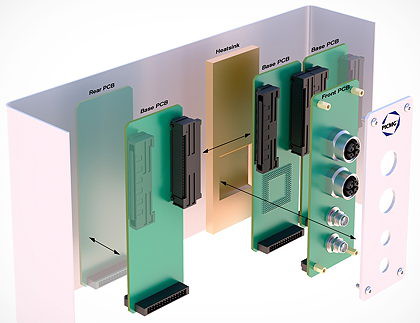The PICMG (PCI Industrial Computer Manufacturers Group) consortium – which has more than 15 members, including Adlink, Eltec, General Micro Systems, Hirose, Intel, Kontron, nVent and Schroff – is hoping to transform the multi-billion dollar box PC industry by introducing an open standard to what is currently a proprietary market. The existing lack of interoperability limits the ability for end-users to achieve cost-effective and sustainable systems, the group says.
The new standard, called ModBlox7, will specify a compact, modular box PC that is flexibly configurable, supports passive conductive cooling, and can be wall-mounted, snapped onto a DIN rail, or integrated into a 19” subrack. The height and depth will fixed, while the width will be variable in multiples of 7HP.
The robust modular designs will be suitable for demanding applications. A PICMG committee is drawing up a specification describing the housing mechanics, function modules and electrical interconnections. The aim is to ratify this specification by the end of 2022.
The open specification is expected to include:
• a cost-effective design that avoids the need for additional backplanes or heatsinks, thus minimising mechanical work;
• coplanar board-to-board connectors that couple each PCB to its neighbour and route I/O interfaces (PCIe and USB) to the next board;
• encapsulated plug-in modules in multiples of 7HP widths for functional assemblies such as power supplies, CPUs, switches and I/O; and
• the ability for each module to host a stack of up to three PCBs, depending on its complexity.
“For industrial end-users, the advantages of a box PC open standard lie in the cost-effective design of the dedicated systems and the flexible interchangeability of components to tailor the platform for dedicated tasks,” says Mathias Beer, chief product officer at PICMG member, Ci4Rail. “Manufacturers also benefit, as the interoperability between the units strengthens their core competence, and they do not have to develop each unit and its embedded components such as cables and mechanics themselves. For VARs and system integrators, the new ecosystem will provide faster configuration options with components from multiple vendors.”
The global industrial PC market is predicted to expand from $4.6bn in 2021 to $6.1bn by 2026 – a CAGR of 5.8%. This expansion is being driven by a growing demand for industrial IoT, the shift towards digitalised manufacturing, stringent regulatory requirements, and a desire among manufacturers to optimise resources.

PICMG’s specification for rugged modular box PCs will bring interoperability to a currently proprietary market

